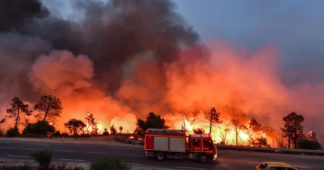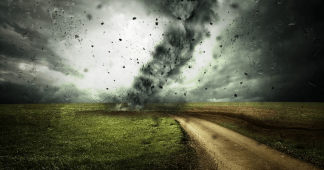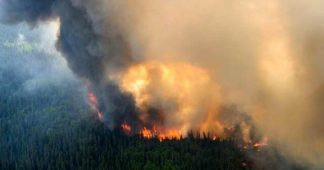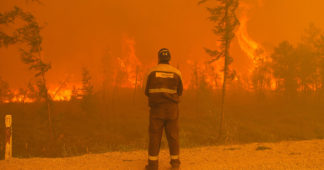Reserach papers note that the Urals are indeed warming; as is Kazakhstan, a former Soviet Republic and among the largest countries globally by area
By Rajat Ghai
10 April 2024
Is the deluge on the continental borders of Asia and Europe in the Ural mountains a result of climate change? That question is uppermost in the minds of many as television stations beam images of catastrophe and almost biblical flooding from Russia and Kazakhstan.
Certainly, the data shows that the Ural mountains — stretching from the Arctic Ocean to the Ural river, which then flows into the Caspian Sea — are warming. Kazakhstan, formerly part of the Russian Empire and the Soviet Union and one of the largest countries in the world by area, is warming too.
A study by scientists A A Vasiliev, L V Ufimsteva, N V Glaz and D Yu Norkhin from the Ural Federal Agrarian Research Center of the Ural Branch of the Russian Academy of Sciences at Yekaterinburg, the main city in the Urals, aimed to identify long-term tendencies in climate change of the Urals — the largest industrial and agricultural region of Russia.
Their 2020 paper Long-term tendencies in climate change of the Urals due to global warming in the journal EDP Sciences, showed that “global warming significantly affects at the climate of the Ural region”.

Map by Tarun Sehgal/CSE
The researchers looked for patterns regarding changes in air temperature and the amount of precipitation by analysing meteorological data from the region.
“During the observation period, the annual air temperature increased: in Yekaterinburg (1832-2018) by 3,1°C, in Zlatoust (1881-2018) by 2,2°C, in Kurgan (1894-2018) by 2,2°C and in Shadrinsk (1894-2018) by 2,1°C. The analogical climate change was noted for the period 1966-2018,” they wrote.
They added that the strongest warming was observed in winter (by 2,3-3,0°C) while the weakest warming was observed in spring (by 0,8-1,7°C).
“We noted an increase the annual amount of precipitation in Ivdel (by 68,2 mm), Shadrinsk (by 50,9 mm) and Krasnoufimsk (by 43,6 mm). Also marked an increase the amount of precipitation during the growing season in Ivdel (by 43,9 mm), Shadrinsk (by 42,8 mm) and Krasnoufimsk (by 26,8 mm). The annual amount of precipitation increased in Chelyabinsk and Yekaterinburg, but the amount of precipitation during the growing season decreased in Kurgan,” according to the researchers.
Favourable changes in the agro-climatic conditions of growing season were noted in Shadrinsk and Zlatoust. “Unfavorable changes in hydrothermal coefficient for cultivated plants were noted in Chelyabinsk, Kurgan, Troitsk, Yekaterinburg and Bredy,” the paper noted.
A 2007 study on the website of Copernicus, the European Union’s Earth observation programme, also noted worrying conclusions about global warming in the Urals.
“Finally, the mean rate of warming increased in the final decades of 20th century,” Climatic changes in the Urals over the past millennium – an analysis of geothermal and meteorological data by D Yu Demezhko and I V Golovanova, noted.
Meanwhile, according to National Hydrometeorological Service of Kazakhstan, the air temperature in the Central Asian giant has increased by 1.37 degrees centigrade over the past 100 or so years.
“Scientists predict a further increase by four degrees by 2050. At the same time, nearly 76 percent of Kazakhstani lands are prone to desertification,” an article from 2018 notes.
Kazakhstan and Central Asia are no strangers to human-made ecological disasters, being the site of the Aral Sea, once the fourth-largest lake which died after the USSR diverted water from the Amu Darya and Syr Darya which fed it, to cotton farms.
Latest reports from the Urals and western Siberia indicate that over 100,000 people have been asked to evacuate their homes as the Ural, Tobol and Irtysh rivers are in flood due to rapid snow melt. The flooding has been described as the worst in 70 years.
The Ural is the third-largest river in Europe after the Volga and the Danube. The Tobol is a tributary of the Irtysh, which in turn flows into the Ob. The Ob-Irtysh river system is the seventh-longest in the world.
Cities including Orsk, Orenburg and Kurgan are the worst affected, according to reports.
We remind our readers that publication of articles on our site does not mean that we agree with what is written. Our policy is to publish anything which we consider of interest, so as to assist our readers in forming their opinions. Sometimes we even publish articles with which we totally disagree, since we believe it is important for our readers to be informed on as wide a spectrum of views as possible.











